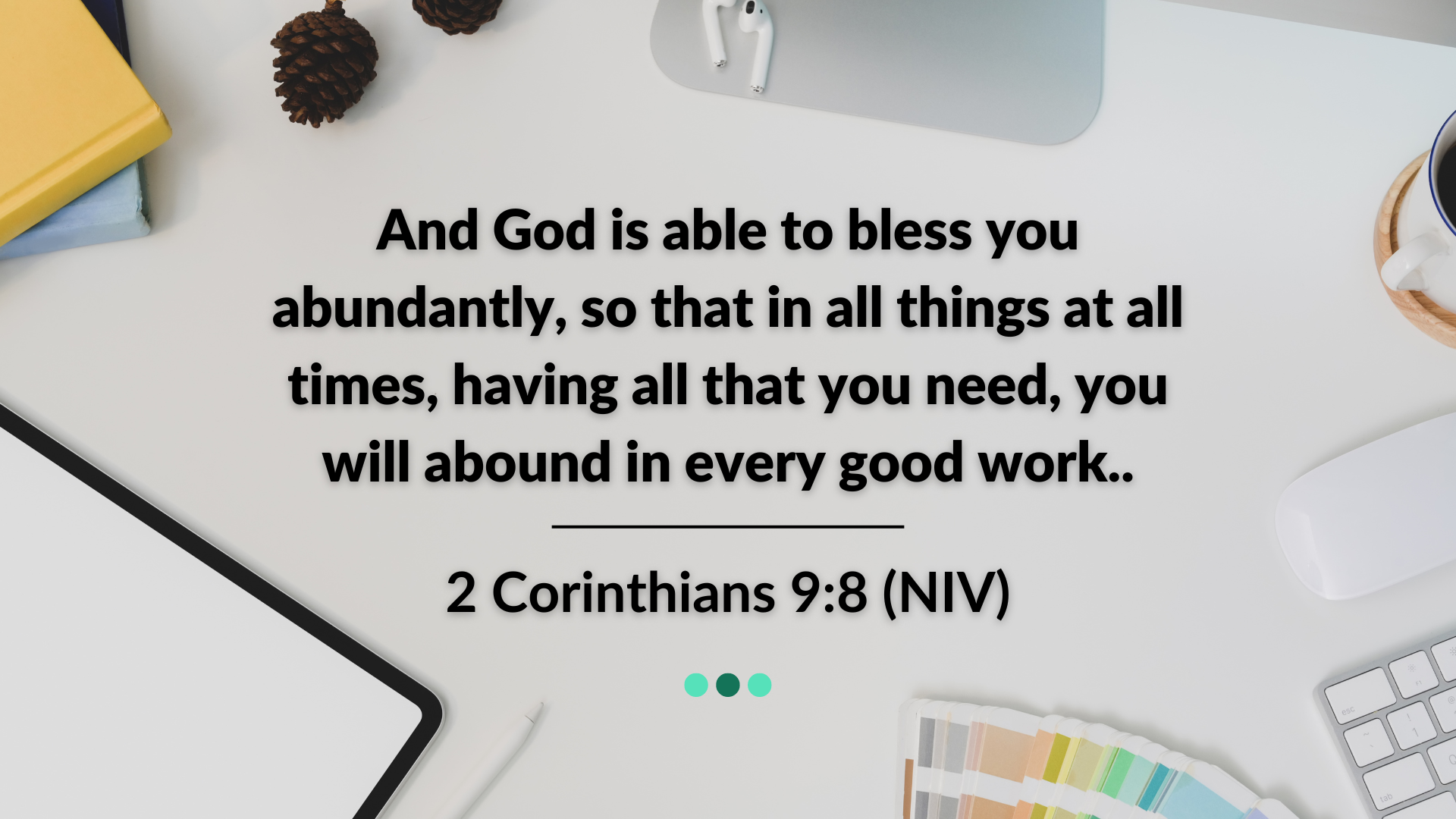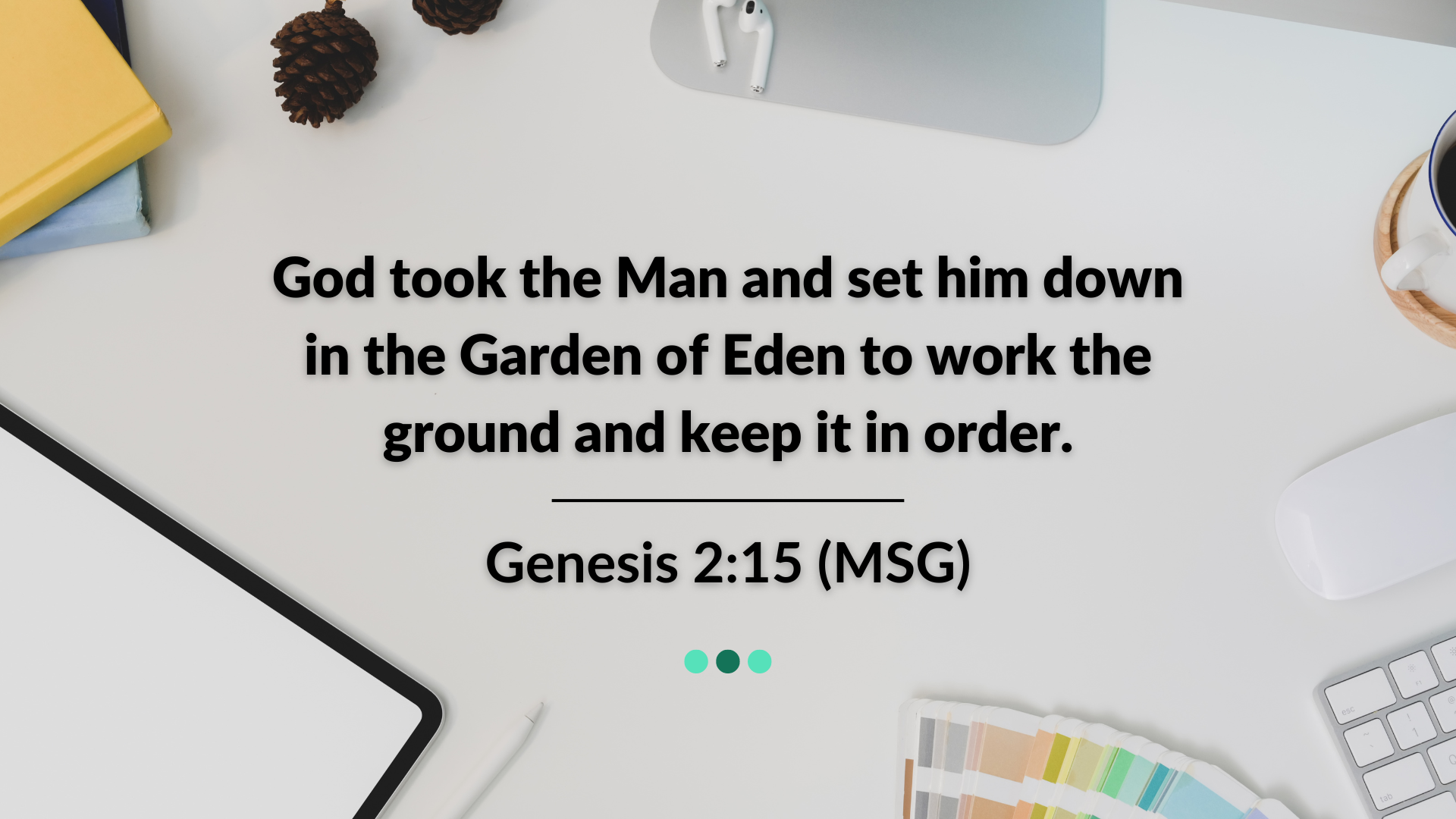Transforming Work Culture: A Biblical Perspective
Good Work as a concept that encompasses the idea of work that is not merely a means of earning a living but aligns with biblical principles and values.

This past Sunday, I had the privilege of attending fellowship at my local church and the sermon left a profound impact on my perspective of work. The sermon, part of a series on “God's Plan for Financial Blessing,” was thought-provoking and insightful, encouraging us to view work as a mission to advance the kingdom of God.
The message was rooted in 2 Corinthians 9:8, emphasizing how God can bless us abundantly, however, let's focus on the last part of this scripture – …you will abound in every good work. Many times, as Christians who cherry-pick scripture, we want to run with that last part and forget what it means to actually abound in every “good work”. This sermon sought to in one way or the other, clarify this.

The sermon addressed issues like laziness, a lack of excellence, and poor work ethic that plague our modern work culture. It also provided a refreshing and much-needed perspective on work and its role in our lives. I don’t think I have taken notes in a sermon as much as I did for this one. We'll delve into the key takeaways from this enlightening message and how it can revolutionize the way we approach our work as referenced from my notes.
Five Biblical Mindsets Towards Work
- God is my source: The foundation of a transformed work culture lies in recognizing that work is a gift from God, a calling, rather than just a job. James 1:17 reminds us that every good and perfect gift comes from above. By viewing work as a divine assignment, we can infuse our daily tasks with purpose and meaning.
- God is my boss: Colossians 3:22-24 teaches us to honour God in our work, making Him our ultimate supervisor. When we work with the understanding that we answer to a higher authority, it elevates our commitment, integrity, and dedication in every task.
- God is my primary partner: Deuteronomy 8:6-19 emphasizes God as our ultimate collaborator in all we do. By relying on Him, we find strength, wisdom, and resilience to excel at work. With God as our partner, nothing is impossible, and we can face any challenge.
- God will bless the work of my hands: Deuteronomy 28:12 encourages practical and diligent work. It reminds us that our efforts, when driven by purpose and executed with excellence, will be rewarded by God. It calls for a proactive approach to work.
- God hates sloppy work: Proverbs 18:9 and 24:30-34 emphasize the importance of excellence. Instead of doing the bare minimum, we are encouraged to cultivate a culture of excellence in all our endeavours. This mindset pushes us to exceed expectations and bring glory to God through our work.

Seven Kinds of Work That God Blesses
- Diligent Work: Proverbs 14:23 and 22:29 extol the virtue of diligence. Diligence involves hard work, persistence, and a commitment to excellence. When we approach our tasks with diligence, we honour God's call to give our best.
- Passionate Work: Ecclesiastes 9:10-12 teaches us to work with passion and enthusiasm. Wholehearted dedication and enthusiasm in our work can transform it into an act of worship, as we give our all for the glory of God.
- Faith-Filled Work: Hebrews 11:6 reminds us to apply faith to our work. Through prayer and unwavering commitment, we can accomplish remarkable feats, trusting that God will guide and support us in our endeavours.
- Faithful Work: Matthew 25:23 commends faithfulness in work. Consistency, reliability, and a sense of duty are valued attributes in the workplace. By being faithful, we demonstrate our commitment to delivering value.
- Excellent Work: 1 Corinthians 10:31 underlines the importance of excellence. Mediocrity has no place in a transformed work culture. Striving for excellence in all we do brings honour to God and reflects His glory.
- Honest Work: Proverbs 13:11 calls for honesty and integrity in our dealings. Honesty at work ensures that our actions align with our faith and values, making our work a testimony to God's grace.
- Kingdom-First Work: Matthew 6:33 encourages us to ground our work in biblical values and prioritize the advancement of the Kingdom of God. When we put the kingdom first, our work takes on eternal significance, impacting not only our lives but also the world around us.
So, we can define Good Work as a concept that encompasses the idea of work that is not merely a means of earning a living but aligns with biblical principles and values. It is work that is characterized by excellence, diligence, integrity, and a sense of purpose. Good work is performed with a mindset that acknowledges God as the source, boss, and partner in all endeavours. It involves a strong commitment to glorify God through one's actions and contributions in the workplace. Good work is marked by a deep passion for one's tasks, a commitment to do one's best, and a dedication to advancing the Kingdom of God through one's vocation. In essence, good work is a calling and a mission that goes beyond personal gain and contributes positively to both the individual and the broader community, reflecting God's grace and values in all aspects of one's professional life.
By adopting the five biblical mindsets and incorporating the seven kinds of work that God blesses into our daily lives, we can revolutionize our work culture. This transformative perspective empowers us to not only find fulfilment in our work but also to make a lasting impact on the world, all for the glory of God. Embracing these principles can indeed change the way we approach our jobs, careers, and vocations, bringing us closer to fulfilling our true purpose in God's grand design for our lives.
Watch the Sermon
You can also watch the fully recorded sermon below.
PS: There are some interesting highlights of the work God has done through the generosity (giving) of many over the past year (2022) with over $1 million in giving. Now we aim for $1.5 million. See details in the video.
Video timestamps: The sermon begins at minute 43:30 with MMO (Giving) highlights.
